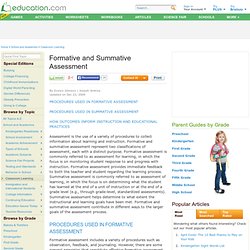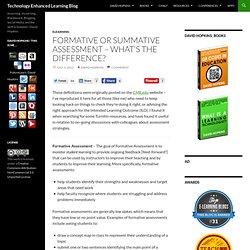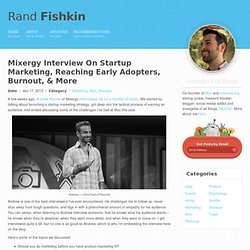

Vickie Park, Ed.D.
Curriculum Coordinator & BTSA Director
Katharine McPhee and Husband Nick Cokas Working on Their Marriage: See Pic of the Couple Reunited! Peter/NPG.com It's official: Katharine McPhee and husband Nick Cokas are trying to repair their relationship.

Nine months after the couple announced their separation, a source close to the 29-year-old actress and her 48-year-old spouse confirms to E! News that they are working on their marriage again. Think 3-D Printing Is Awesome? Wait Until You See What This Teen Made for a Kid. Formative and Summative Assessment. Assessment is the use of a variety of procedures to collect information about learning and instruction.

Formative and summative assessment represent two classifications of assessment, each with a distinct purpose. Formative assessment is commonly referred to as assessment for learning, in which the focus is on monitoring student response to and progress with instruction. Formative assessment provides immediate feedback to both the teacher and student regarding the learning process. Summative assessment is commonly referred to as assessment of learning, in which the focus is on determining what the student has learned at the end of a unit of instruction or at the end of a grade level (e.g., through grade-level, standardized assessments).
Summative assessment helps determine to what extent the instructional and learning goals have been met. Formative assessment includes a variety of procedures such as observation, feedback, and journaling. Feedback. End of unit tests or projects. Formative or Summative Assessment – what’s the difference? These definitiona were originally posted on the CME.edu website – I’ve reproduced it here for all those (like me) who need to keep looking back on things to check they’re doing it right, or advising the right approach for the Intended Learning Outcome (ILO).

I found it when searching for some Turnitin resources, and have found it useful in relation to on-going discussions with colleagues about assessment strategies. Formative Assessment – The goal of Formative Assessment is to monitor student learning to provide ongoing feedback [feed-forward?] That can be used by instructors to improve their teaching and by students to improve their learning.
More specifically, formative assessments: Why Your Kid’s Next Laptop — But Not Yours — Should Be a Chromebook. How Schools Improve:School Culture: An Invisible Essential. I sensed that the Louis Pasteur School1 was special as soon as I walked through the front door.

The secretary greeted me warmly and pointed me to a table holding a coffeepot, cups, and a plate of doughnuts. The bulletin board behind her desk was filled with student art; her desk was awash in papers, notes, and telephone messages. Pat, the school's principal, hugged a 1st grade birthday girl before smiling to me in welcome. A tour of the school confirmed my first impression. The resource center was abuzz with kids reading in all kinds of postures.
As we walked the halls, it became clear to me that Pat was a constant presence in the building. During our meeting, Pat talked about her efforts to raise student achievement—especially that of minority learners, who constitute 40 percent of Pasteur's student body. Too often, the opposite is true. Literature about good schools defines culture as the context in which everything else takes place: “the way things are done around here.” Beginners_guide_to_social_media. Mixergy Interview On Startup Marketing, Reaching Early Adopters, Burnout, & More. Date / / Category / Marketing, Moz, Startups A few weeks ago, Andrew Warner of Mixergy interviewed me on a number of topics.

We started by talking about launching a startup marketing strategy, got deep into the tactical process of earning an audience, and ended discussing some of the challenges I’ve had at Moz this year. The Interest Graph on Twitter is Alive: Studying Starbucks Top Followers. InShare1,306 Social media is maturing as are the people embracing its most engaging tools and networks. Perhaps most notably, is the maturation of relationships and how we are expanding our horizons when it comes to connecting to one another. What started as the social graph, the network of people we knew and connected to in social networks, is now spawning new branches that resemble how we interact in real life. This is the era of the interest graph – the expansion and contraction of social networks around common interests and events.
Interest graphs represent a potential goldmine for brands seeking insight and inspiration to design more meaningful products and services as well as new marketing campaigns that better target potential stakeholders. Alpha: Computational Knowledge Engine. Blogging vs. Building — on startups. Hiten Shah recently shared these words with me on MessageMe: The more you blog, the less you are building.

I’m currently parked at blogging HQ, Philz Coffee, writing. I write frequently, dedicating 1-3 hours every day and publishing up to three posts each week (I have a dozen unpublished essays finished in my “queue”). Many people have asked why I spend so much time writing, sometimes criticizing this daily routine and questioning its value. To Blog or Not to Blog. North Korean College Entrance Exams to be Computerized. A computerized grading system for entrance exams to major universities in North Korea will be extended to local colleges beginning in March, but logistical snarls may result as parents in rural areas struggle to get students to the testing sites, according to sources inside the country.

Applicants who previously took handwritten exams—all on the same day—at their local colleges will now have to travel on separate dates to a single location in each province to be tested, a source in North Korea’s northern Chagang province told RFA’s Korean Service. “The local college entrance exam will be taken at the provincial library in each province.